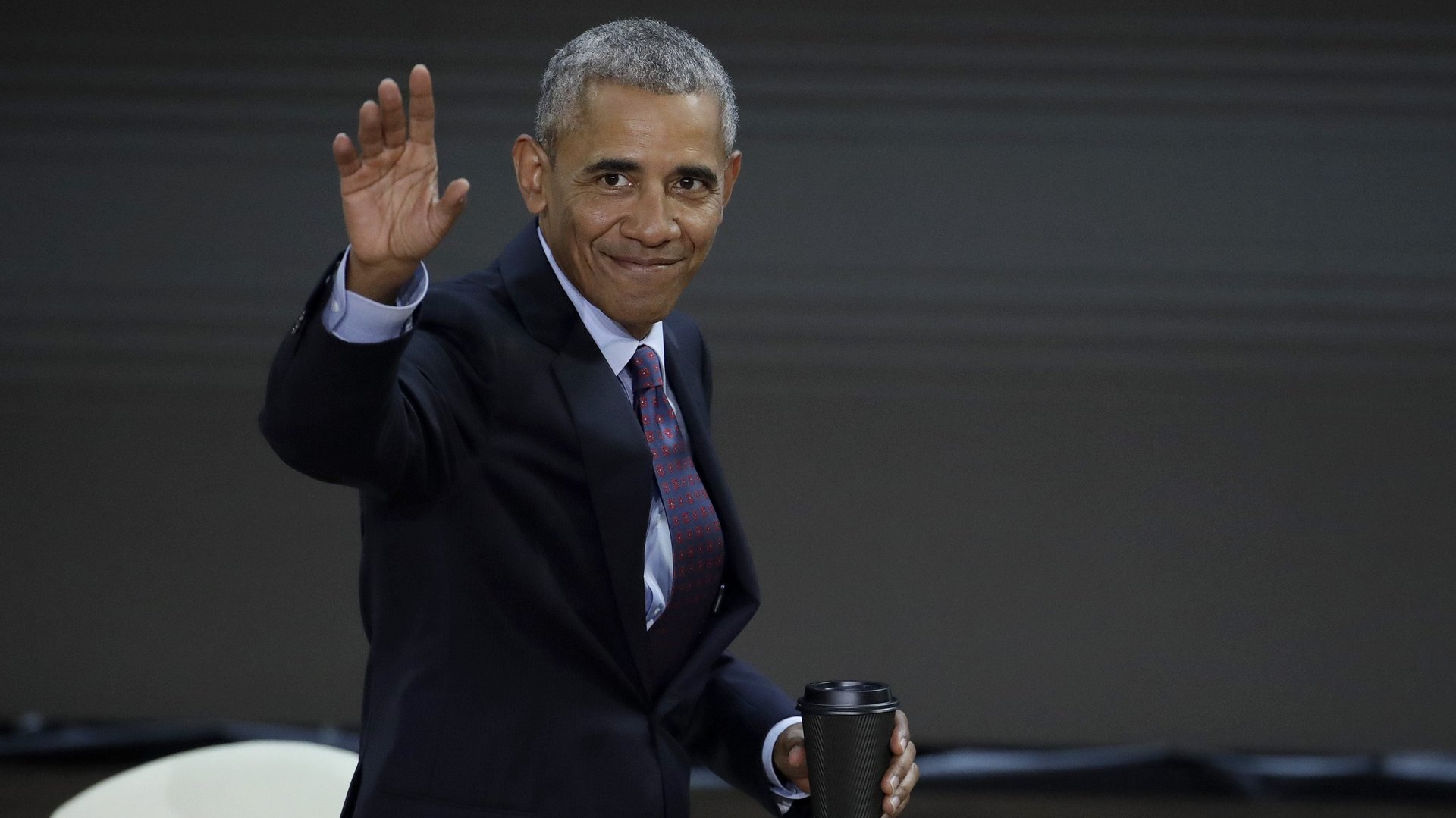“Relentless and infectious optimism”: Barack Obama’s recipe for success in a scary world
The first two big speeches of this week’s UN general assembly didn’t exactly fill the heart with joy. The normally philosophical UN secretary general Antonio Guterres told gathered leaders that “our world is in trouble; people are hurting and angry,” that “societies are fragmented,” and that “we are a world in pieces.”


The first two big speeches of this week’s UN general assembly didn’t exactly fill the heart with joy. The normally philosophical UN secretary general Antonio Guterres told gathered leaders that “our world is in trouble; people are hurting and angry,” that “societies are fragmented,” and that “we are a world in pieces.”
Never one to lighten the mood, US president Donald Trump then expounded on how each day “brings news of growing dangers that threaten everything we cherish and value” in a world held hostage by terrorists, “rogue regimes,” and “the most destructive weapons known to humanity.”
So it was something of a breath of fresh air from a familiar face when Trump’s predecessor Barack Obama brought his trademark grin to the stage of the Gates Goalkeepers side conference. In a chipper mood in his post-presidential life, Obama’s speech focused not on the perils ahead but what everyone can do to overcome them. That began, however, by rejecting Trump’s bleak worldview: If offered to pick any period of human existence to live in, “this would be the time you wanna be showing up on this planet,” Obama said, pointing to developments in education, women’s rights, and minority rights.
If the speech was an Audacity of Hope riposte to Trump’s Art of the Deal diatribe, then the manifesto summed up in a sentence was: “Your response has to be to reject cynicism and reject pessimism and push forward with a certain infectious and relentless optimism—not blind optimism, not one that ignores the scale and the scope of challenges—but a hard earned optimism that’s rooted in the stories of very real progress that have occurred throughout human history,” he said.
The former president leaned heavily on his favorite themes of the individual’s ability to drive progress and the need to understand that positive change is often incremental, not revolutionary. “Our successes—even though they sometimes are small and incomplete—accumulate; they build, and they create a trajectory that’s better,” he said. “You have to be persistent… I think so often we get impatient because change does not look as discernible, or immediate, or impactful as we had imagined in our mind, and we get disappointed, and we get frustrated.”
Obama wasn’t alone in his optimism. The Gates conference and a simultaneous event run by Bloomberg (both are competing for the mantle of premier UN side event) featured a who’s who of rich and powerful men (yup, pretty much all men) telling delegates how great the future was going to be.
Microsoft founder and billionaire philanthropist Bill Gates‘s notorious optimism was reflected in the Goalkeepers conference—an event that dwelled on good stories and results rather than challenges and obstacles. Gates shared his philosophy on stage, saying “I do think that convincing people that things are improving is important.”
Canadian prime minister Justin Trudeau told Melinda Gates that he was “incredibly optimistic about the future… there are so many more levers to impact change now.”
Nobel laureate and activist Malala Yousafzai said of her work, “I believe we can see every girl in school in my lifetime, because I believe in local activists and champions.”
Philanthropist Melinda Gates noted the growing gains of female empowerment: “Women’s movements have been forging and winning campaigns for a better, more equal future, for a very long time.”
Alibaba founder and CEO Jack Ma addressed the fears about artificial intelligence, in somewhat broken English: “The wisdom of human beings are everywhere and I think we should, human beings, should have confidence in our self…the new technology will destroy a lot of jobs, but also will create a lot of jobs.”
French president Emmanuel Macron delivered a similar message about technological change: “We will destroy a lot of classical sectors, but we will create more jobs opportunity in digital, in energy and in new sectors.”
Indian auto magnate Anand Mahindra extolled business opportunities in sustainable development: “When we heard that America is [pulling] out of the Paris agreement, that’s unfortunate, but frankly, speaking purely from my competitive juices point of view, we are delighted if somebody’s not going to look at these opportunities, they’ll be all there for us.”
Apple CEO Tim Cook summed up the prevailing mood: “I am more optimistic today than I have ever been and I mean that sincerely… overall, I think we have an incredible opportunity because never before have I seen the ability, all across the world, to work together on some of these common issues.”
So, “roll up your sleeves,” as Obama put it, stop worrying about North Korea, and prepare for our brilliant future. Okay?